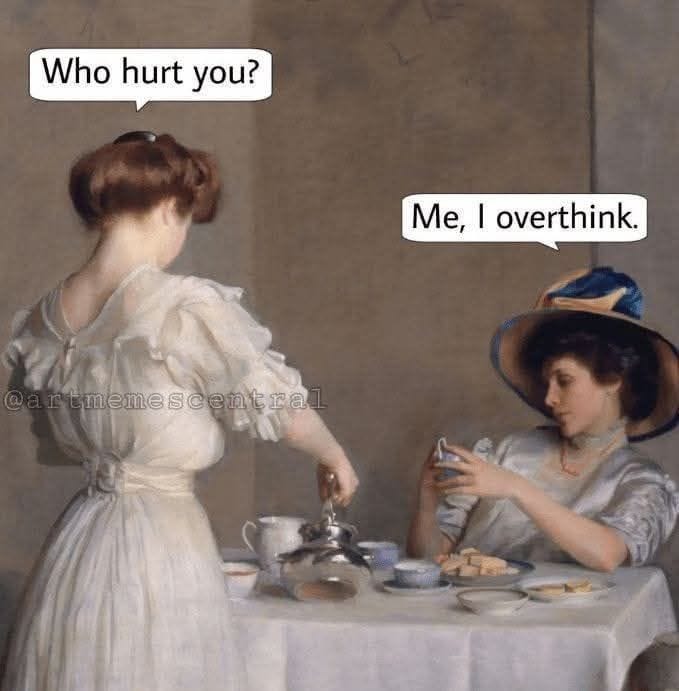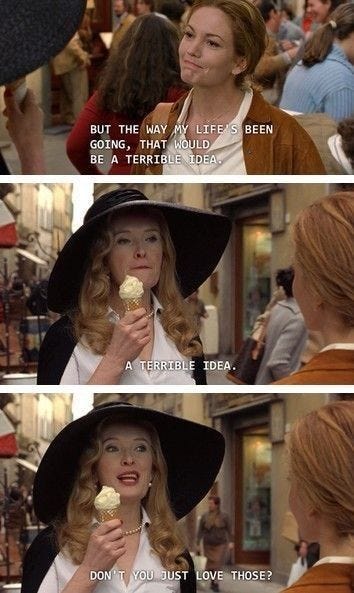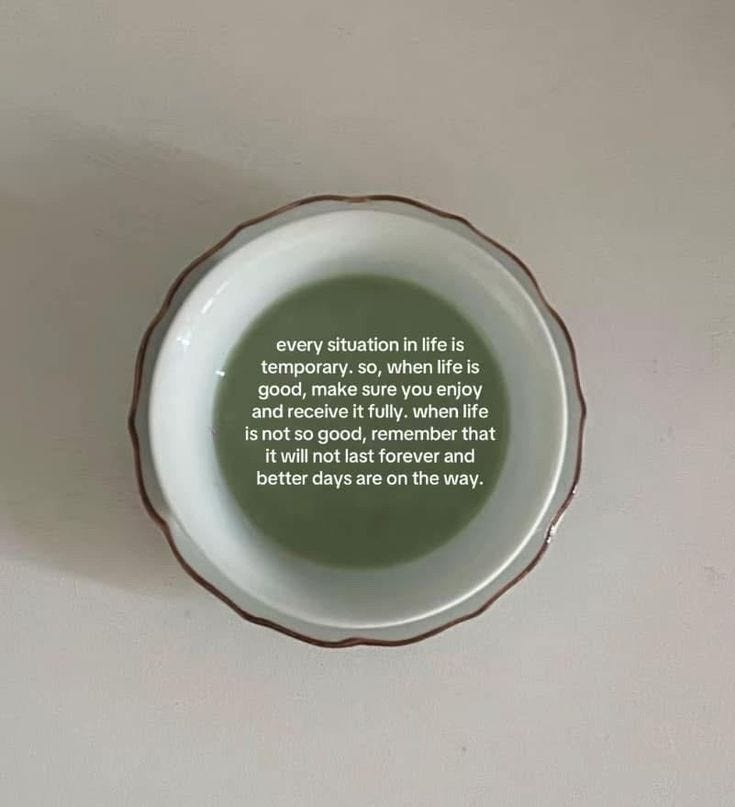Why Women Overthink- A Series .01
I did it again just now wondering what I should put as a tagline
Hi,
My name is Giana and I’m a recovering chronic over thinker.
Over thinking is bad for your health and I had a lot to think about the last half of 2024. A lot of wondering and contemplating. While it’s great to reflect, I realized i had eventually found myself at the edge of a cliff I wasn’t able to pull myself away from. The more I thought, the more was pulled into another as though a magnetic force was forcing me into another train of thought. I would weave threads between each thing as though they had everything to do with each other when really they had nothing at all in common. The thoughts in my head were creating a reality that my body began to live in whether they were true or not.
I believe i had what they call an epiphany after experiencing deep emotional distress for a string of months. There was nothing else I could do anymore besides let go. I had ruminated, dwelled, thought, tried to fix enough before I felt so helpless and had no choice but to just let it go. The lie I had told myself over and over by overthinking was that i had any sort of control on what was going on around me. I had zero and the sooner I could accept that, the sooner I could be at peace.
The things I tend to over think about are making the best decisions for the kids, school, activities, their relationships with each other, whether or not I’m doing enough to encourage their connection as brothers. I can also be found spiraling about my own relationships with other people like friends and family if we’re close enough, if I do enough, if I checked in enough, gave enough in the christmas or birthday gift, if I reach out enough, if I support enough, and then because I’m pouring so much into them and the relationship, I end up wondering whether or not the value it as much as I do. And so begins another spiral.
I think at a young age i learned to lean into empathy, making sure others were ok or felt like I was a safe space for them because maybe I wanted them to mirror that safety and maybe if I proved how good of a daughter, sister, friend, i was then things would be always be ok. It made many of my quiet moments alone quite loud finding my thoughts wandering back into rumination over conversations, interactions, and past decisions.
Asking why and searching for the reason behind every little thing was a default mindset for me as I fought to prevent any emotional discomfort for anyone else let alone myself. It’s literally like being in prison within your own mind and of your own doing, and I had to get out. But how? How do we manage to crawl our way out of driving ourselves crazy thinking and ruminating?
I spent much of my childhood imagining the kind of woman I’d be one day. The one that would appear in my mind wasn’t riddled with thoughts and crippled by indecision. She was free, at peace, joyful, and fun not second guessing whether someone found her pleasant enough. Blah.
I had to make myself stop. It was a decision I made one day to just stop and when I catch myself doing it now, I ask myself the qualifiers of whether or not I have any control over the situation and if I did my best in that moment with what I had or knew. From there, I make an active choice to move on. One of the movies that gets me out of a funk is Under the Tuscan Sun. There’s a part in the movie where France is out for a walk and her friend Katherine sees her from her bedroom window. She invites her up and after a few moments of gazing upon France’s moping face, Katherine tells her “you’re so boring. you’re sad. you’re like a big black hole.” She kicks her out sending her home ordering her to work on her house and forget about it.
We all need a friend like Katherine. She’s a real one.
There are ways to stop overthinking, and it is my personal belief that you cannot stop yourself until you’ve uncovered why you overthink in the first place.
welcome to The Mindful Spiral-Turning Overthinking into Wisdom, a series to help us all return to stillness.
so where does this all begin? let’s get a little technical.
we over think because of a deep seeded need for control, security, and emotional safety, a level of predictability if you will, especially in environments where those needs have historically gone unmet.
When we over think, we often habitually
fear uncertainty or making the wrong decision
internalize high expectations from ourselves and others
use over analysis as a way to avoid emotional discomfort in the short and long term
struggle with self-trust due to past experiences of betrayal, judgment, or instability
According to the book Women Who Think Too Much by Susan Nolen-Hoeksema, very highly intelligent and self aware women are big part of those who are crippled by overthinking.
1. High Cognitive Capacity Fuels Analysis
Intelligent women often have strong pattern recognition, verbal fluency, and problem-solving skills. This means their minds naturally scan for meaning, context, and possible outcomes in even the smallest of situations. This sounds great right? A crew of excellent thinkers and communicators. However, it can come with using our minds as mental search engines often finding it difficult to shut it off.
"Overthinking is often a misuse of a brilliant mind—it’s insight without a resting point."
— Inspired by clinical insights from Dr. Susan Nolen-Hoeksema, author of Women Who Think Too Much
2. Empathy Amplifies Internal Dialogue
Ah the blessing and curse it is to be a highly empathetic woman. We tend to be relationally oriented and emotionally attuned to ourselves and others. This means we often absorb emotional cues instead of simply holding space and letting them go. We often feel responsible for other people’s responses, and replay interactions with a deep desire to have done or said the “right thing.” Overthinking becomes a way of scanning for emotional safety and maintaining homeostasis.
Empathy without boundaries can turn inner wisdom into worry loops. What begins as care can spiral into self-blame or mental rehearsals of conversations.
3. Trauma & Social Conditioning Link Thought to Safety
For many of us, overthinking is a learned survival skill. Particularly if you’ve grown up around unpredictability, emotional neglect, or societal pressure to “be nice” and avoid mistakes. In these cases, overanalyzing isn’t the flaw, it’s a coping mechanism for staying safe, liked, or in control.
“Women are often trained to be relationally hyperaware. Overthinking is frequently the internalization of vigilance.”
— Dr. Thema Bryant, psychologist and trauma expert
4. The Double Bind of Self-Awareness
As highly self-aware women, we are more likely to reflect deeply on their choices, words, and impact they have on everything around us. Which yes, is a strength however, when self-awareness lacks compassion for oneself, it can morph into self-criticism. This is where intelligence and insight become overridden with one’s perceived flaws, keeping the mind in a constant loop that is incredibly difficult to stop.
If you happen to be nodding yes the whole way through, welcome and overthinking doesn’t have to be a forever thing. I’ll be back next Tuesday to share for part 2 in The Mindful Spiral-Turning Overthinking into Wisdom, a series to help us return to stillness..
I hope this was helpful in many ways and I hope you share it with a friend who might need it too.
Not everything we think is true, but everything we think, if we dwell on it long and deep enough into it’s fibers, will become the stepping stones upon which we create habits, leaving us with behaviors ultimately manifesting the very lie we’ve convinced ourselves was true.
XX,
Gi






